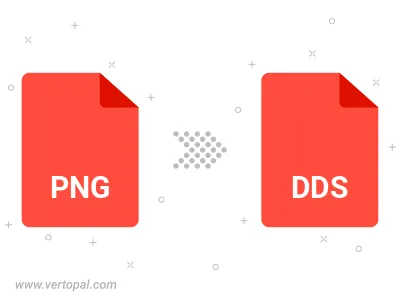Convert PNG to DDS
Convert PNG images to DDS format, edit and optimize images online and free.

The Portable Network Graphics (PNG) file extension, established in 1996, serves as a widely-used raster graphics format that supports lossless data compression. Initially developed as a superior, patent-free replacement for the GIF format, PNG is prevalent in the IT industry for web design, digital photography, and complex graphics due to its capability to handle detailed images with transparent backgrounds and its extensive color range. Known for maintaining high-quality visuals without increasing file size significantly, PNG remains an indispensable tool in professional digital imaging and web development.
The DirectDraw Surface (DDS) file extension is used primarily for storing graphical textures and cubic environment maps in the field of computer technology. Introduced by Microsoft with DirectX 7.0, DDS files facilitate efficient loading and storage of texture data, crucial for rendering 3D graphics in real-time applications like video games and simulation software. These files support both uncompressed and compressed formats, leveraging S3 Texture Compression (S3TC) to optimize memory usage and performance. DDS files are indispensable in modern graphics programming, enabling quick texture manipulation and robust graphical asset management.
Select the PNG image you want to process by browsing your computer.
Choose optional PNG to DDS tools for advanced conversion.
After the DDS conversion finishes, click Download to retrieve the file.

Rotate PNG to right (90° clockwise), to left (90° counter-clockwise), 180°, and convert it to DDS.
Flip PNG vertically and/or horizontally (flop), and convert it to DDS.
PNG, a lossless format, is widely used for general graphics, while DDS is optimized for real-time rendering, offering compression methods beneficial for game development and texture mapping.
PNG preserves full image fidelity with lossless compression, ideal for static visuals. DDS supports lossy and lossless compression, with formats like DXT providing reduced file sizes at the cost of minor quality loss, crucial for efficient memory usage in graphics applications.
Various image editors and command-line utilities, including specialized game asset converters, support this transformation, often offering batch processing for large-scale workflows.
DDS files support mipmaps and hardware acceleration, enhancing rendering efficiency, particularly in 3D environments requiring optimized textures.
PNG uses alpha channels for transparency, which must be correctly mapped to DDS formats supporting transparency, such as DXT5 or uncompressed variants, to maintain visual integrity.
Use Vertopal CLI to process PNG image and export as DDS image.